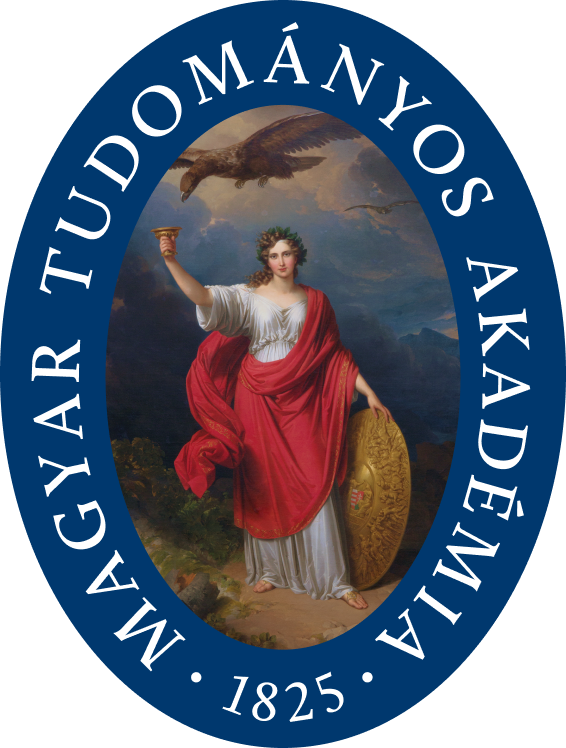Archives
-
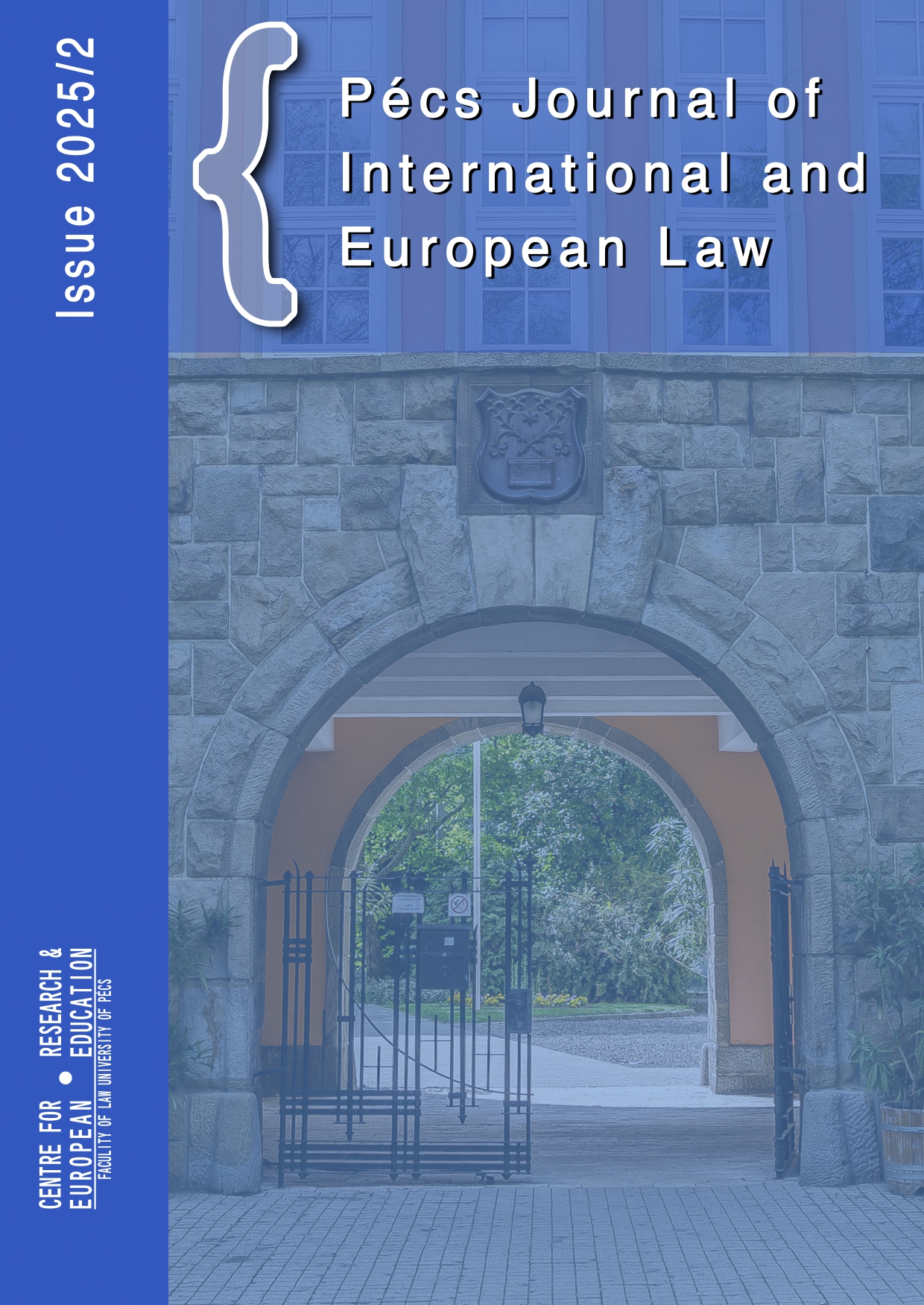
No. II (2025)
The editors are pleased to present issue 2025/II of the Pécs Journal of International and European Law, published by the Centre for European Research and Education of the Faculty of Law of the University of Pécs.
In the following paragraphs, we are giving a brief summary of the contents of the Original Scientific Articles section.
In the article “Externalisation within the migration policy of the European Union”, the author, Márton Balogh presents the agreements concluded between the EU and its partner countries (such as the EU–Turkey Statement and the EU–Tunisia Memorandum) and highlights the inadequate procedures and human rights concerns arising from the problematic nature of the externalisation system. Balogh concludes that although the externalisation of migration and asylum policy constitutes a step in the right direction insofar as it reduces the burdens placed on the EU, this must not occur at the expense of the effective protection of human rights. The author suggests that such cooperation should be concluded in the form of legally binding international treaties, thereby enabling the effective enforcement of institutional guarantees (such as the competences of the European Parliament and the Court of Justice of the European Union) as well as human rights safeguards (such as impact assessments).
Ágnes Töttős, in her study “Achievements of the Hungarian Presidency of the Council in Promoting the Schengen Area as a Strategic Asset for the EU”, addresses the strengthening of Schengen governance, the digitalisation of procedures (in particular the introduction of the CES/EES and ETIAS), and efforts to facilitate the accession of Romania and Bulgaria to Schengen. The author concludes that the Hungarian Presidency delivered transformative results, including the enlargement of the Schengen Area, as the Council adopted a decision to lift personal border checks with Bulgaria and Romania at the internal land borders from 1 January 2025.
At the same time, challenges remained, such as delays in the implementation of the Entry/Exit System (EES) and the need for its phased rollout. According to Töttős, the Hungarian proposal to establish a Schengen summit remains on the agenda and should be given serious consideration in light of the various threats and challenges facing the Schengen states.
In the article “Critique on Universalism Versus Cultural Relativism Debate, With Special Attention to Customary Law and Constitutionalism In South Africa”, Wandile Brian Zondo analyses the tensions between respect for customary law and compliance with universal human rights norms, citing the cases of Bhe v. Khayelitsha Magistrate Court and Shilubana v. Nwamitwa as examples. Zondo argues that the binary framework of the universalism versus cultural relativism debate often creates confusion and hinders constructive dialogue. He concludes that progress requires dialogue and an integrative approach that recognises the dynamic nature of cultures and allows customary law to adapt to constitutional values, ensuring the protection of human rights without discarding the importance of cultural
identity.
In the study “Questions of Attribution in the Conflict of Eastern Congo”, Mátyás Kiss focuses on Rwanda’s role in the conflict in eastern Congo, examining whether the internationally wrongful acts committed by the armed group known as M23 can be attributed to Rwanda under the rules of international responsibility, in particular Articles 4 and 8 of the Articles on Responsibility of States for Internationally Wrongful Acts (ARSIWA). The author finds that the strict criterion of “complete dependence” required for recognition as a de facto state organ cannot be established with certainty in the case of M23, and although Article 8 ARSIWA appears to be the most applicable provision, the “effective control” test applied by the International Court of Justice sets an excessively high threshold, as control must extend to the specific operations in question. Kiss concludes that, on the basis of the existing evidence, it cannot be established that all internationally wrongful acts committed by M23 are attributable to Rwanda, and therefore calls for the development of a more coherent and uniform assessment framework in order to enhance the predictability of international law.
In the Review section Tiwai Mhundwa provides a book review for Maria Bergsröm and Valsamis Mitsilegas’ 2025 book EU Law in the Digital Age published by Hart.
As usual, we thank the anonymous peer reviewers for their considerable effort
working on the current issue.
We also encourage the reader to consider the PJIEL as a venue for your publications. With your contributions, PJIEL aims to remain a trustworthy and up-todate journal of international and EU law issues. -
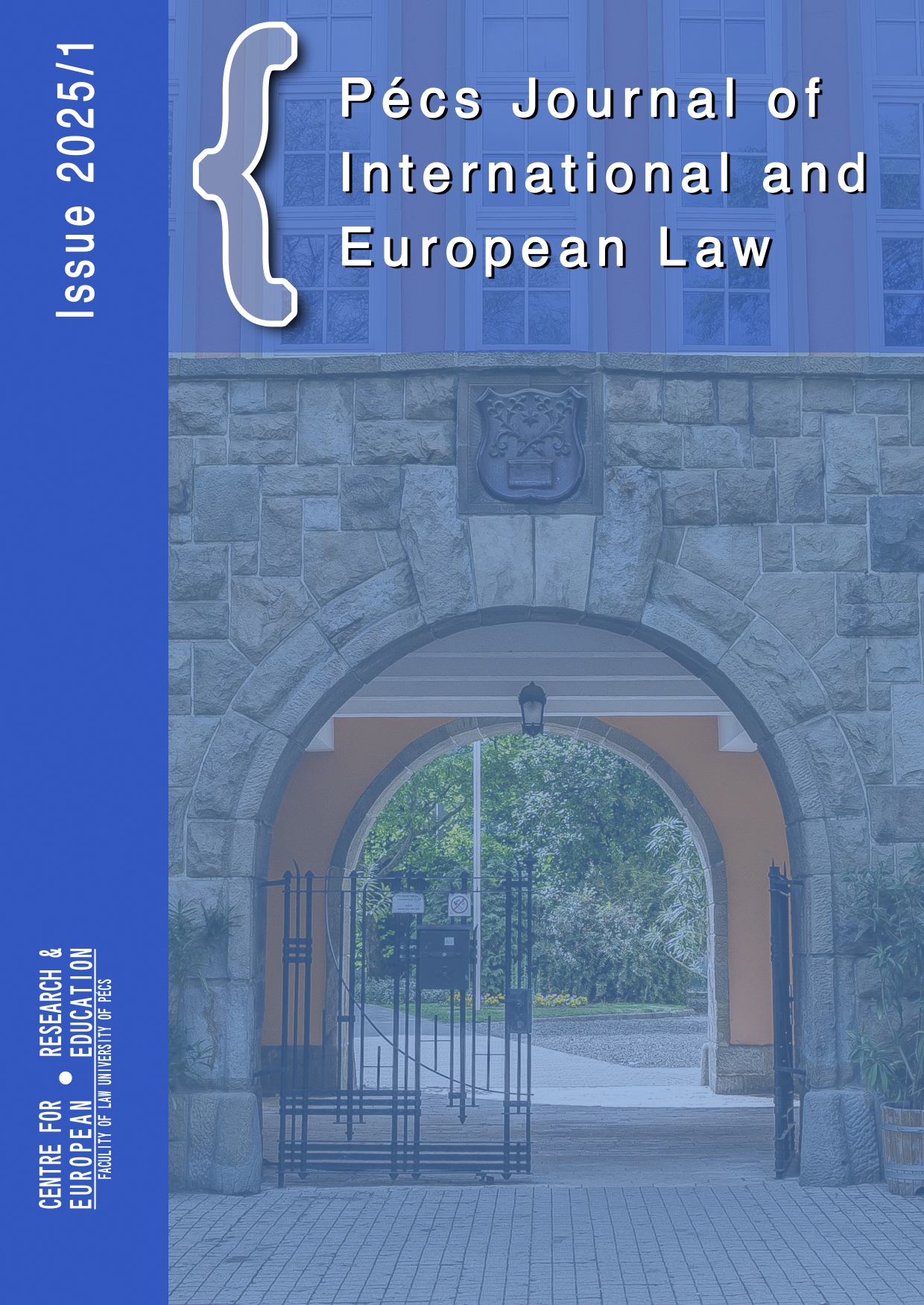
No. I (2025)
The editors are pleased to present issue 2025/I of the Pécs Journal of International and European Law, published by the Centre for European Research and Education of the Faculty of Law of the University of Pécs.
In the Articles section, Tomasz Bojanowski evaluates standards of preparatory proceedings in Europe, looking at Council of Europe and European Union requirements as well. Soma Szántó analyses the revolving door issue in the EU institutions and provides a critique of various current regulatory frameworks in place. Szimonetta Tóth reviews the Bracero Program and discusses its effect on US-Mexico relations in general as well as regards labour migration.
In the Case Notes and Analysis section, Jan Stajnko shares his thoughts on the occasion of a recent lecture by UN Special Rapporteur Francesca Albanese.
In the Review section, Mátyás Kiss provides a summary of the main findings of the conference entitled ‘Innovative Research Approaches in Combating Trafficking in Human Beings’ organised at the Faculty of Law of the University of Pécs in Summer 2025.
A word of most sincere gratitude is due to the anonymous peer reviewers of the current issue.
We encourage the reader to consider the PJIEL as a venue for your publications. With your contributions, PJIEL aims to remain a trustworthy and up-to-date journal of international and EU law issues.
-

No. II (2024)
The editors are pleased to present issue 2024/II of the Pécs Journal of International and European Law, published by the Centre for European Research and Education of the Faculty of Law of the University of Pécs.
In the Articles section, Dimitris Liakopoulos provides an analysis of how EU law perceives and regulates renewable energy and its environmental impact. Gergely Kappel presents a comprehensive literature review as regards the risks of artificial intelligence-based decision support in companies’ executive-level decision- making.
In the Case Notes and Analysis section, Ágoston Mohay ponders the question whether the lengthy process of the EU’s accession to the ECHR is finally set to end thanks to the renegotiated draft accession agreement of 2023.
In the Book Review section, firstly, Maria Melikidou reviews the monograph ‘The European Arrest Warrant and EU Citizenship. EU Citizenship in Relation to Foreseeability Problems in the Surrender Procedure’ by Joske Graat, published by Springer in 2022. Secondly, Tiwai Mhundwa looks at the edited volume ‘International Labour Mobility: How Remittances Shape the Labour Migration Model’ published by Palgrave Macmillan in 2023.
A word of most sincere gratitude is due to the anonymous peer reviewers of the current issue.
We encourage the reader to consider the PJIEL as a venue for your publications. With your contributions, PJIEL aims to remain a trustworthy and up-to-date journal of international and EU law issues.
-
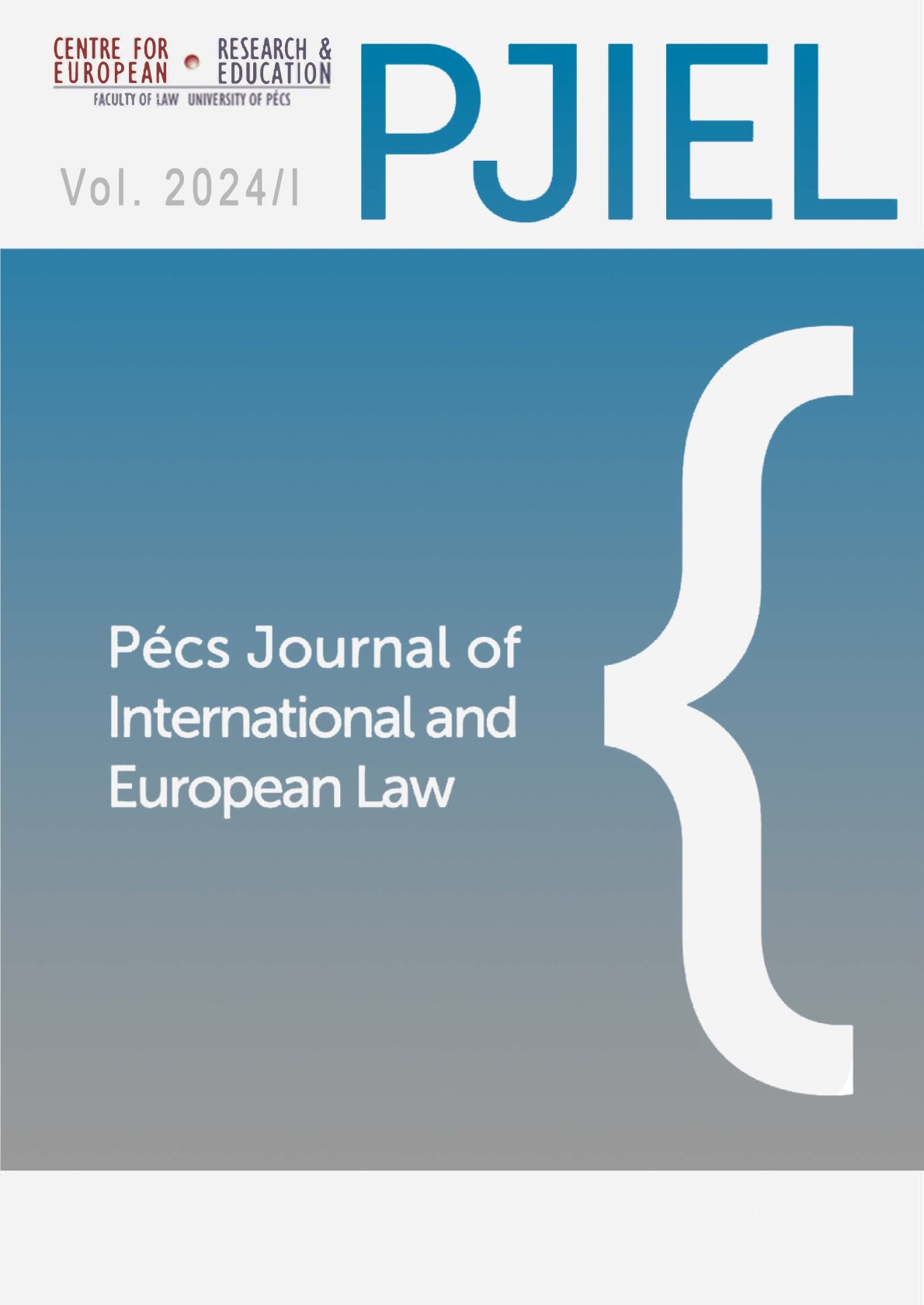
No. I (2024)
The editors are pleased to present issue 2024/I of the Pécs Journal of Interna- tional and European Law, published by the Centre for European Research and Education of the Faculty of Law of the University of Pécs.
In the Articles section, Sandra Fabijanić Gagro and Marissabell Škorić undertake an analysis of the implementation of the Istanbul Convention in the Repub- lic of Croatia in light of SDG-5. Nguyen Thi Quynh provides a comparative study of carrier liability in international conventions on the carriage of goods by sea. Judit Tóth and Erzsébet Kardosné Kaponyi elaborate on the concept of a ‘homo digitalis’ in light of relevant EU and Hungarian legislative (and societal) developments. Nguyen Thi Kim Cuc looks at how the protection of fundamen- tal rights corelates with the objectives of the EU’s Area of Freedom, Security and Justice.
In the Case Notes and Analysis section, Stjepan Novak reflects on constructive ab- sence in the decision-making process of the European Council, drawing broader conclusions from the practice as recently employed by Hungary.
In this issue’s Book Review, Mátyás Kiss provides an evaluation of the second edition of Understanding Cyber Warfare. Politics, Policy and Strategy, published by Routledge in 2023.
As always, a word of sincere gratitude is due to the anonymous peer reviewers of the current issue.
As always, we encourage the reader to consider the PJIEL as a venue for your publications. With your contributions, PJIEL aims to remain a trustworthy and up-to-date journal of international and EU law issues.
-
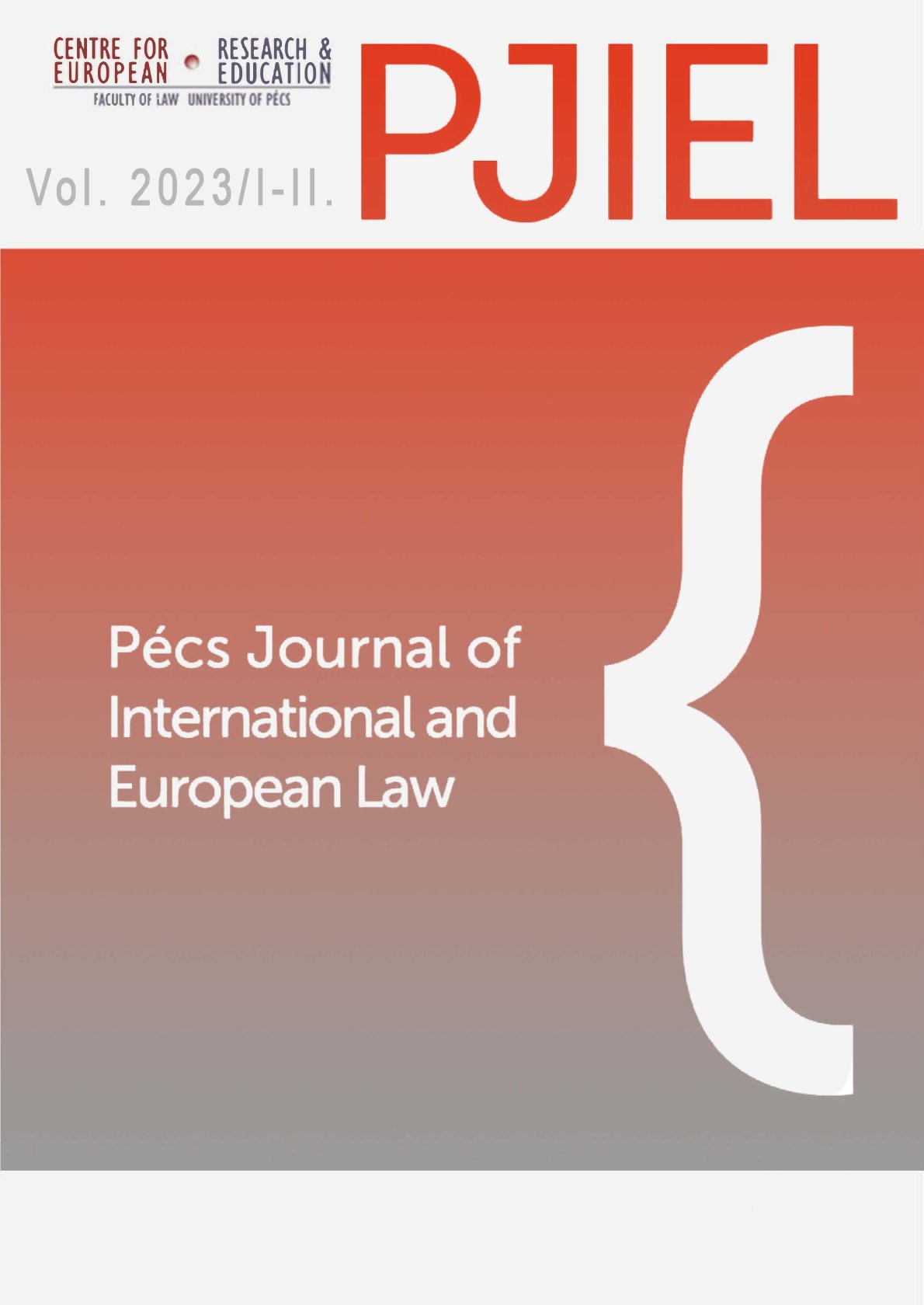
No. I-II (2023)
The editors are pleased to present issue 2023/I-II. of the Pécs Journal of International and European Law, published by the Centre for European Research and Education of the Faculty of Law of the University of Pécs.
In the Articles section, Dalma Takó provides an analysis of clauses allowing for possibility of choice in international treaties. Bence Kis Kelemen, Ágoston Mohay, Attila Pánovics and Nor- bert Tóth elaborate on the elusive contours of responsibility of international organizations. Gagik Chilingaryan provides insight into the status of national minorities in the Republic of Armenia in light of the Framework Convention for the Protection of National Minorities. Bence Kis Kelemen elaborates upon the responsibility of international organizations for outer space activities. Marta Romańska, Agata Cebera and Jakub Grzegorz Firlus delve into the peculiar issue of the case of so- called ‘LGBT free zones’ in Poland.
In this double issue’s Case note, István Szijártó looks into three recent cases of the European Court of Justice in the field of criminal cooperation between Member States.
As always, a word of sincere gratitude is due to the anonymous peer reviewers of the current issue.
This double issue also marks the end of an era for PJIEL: from 2024, the journal will apply the Open Journal Systems model of functioning, reaffirming our commitment to open access scientific publishing.
As always, we encourage the reader to consider the PJIEL as a venue for your publications. With your contributions, PJIEL aims to remain a trustworthy and up-to-date journal of international and EU law issues.
Corrigendum
In Issue 2022/II, an unfortunate error occurred. The family name of one of the authors of that issue, Sandra Fabijanić Gagro (Human Security and Responsibility to Protect – Challenges and Intersec- tions, pp. 6-19.) has been misspelled, along with her position (which is, in reality, full professor). The editors wish to apologize for the error and any inconvenience caused.
-
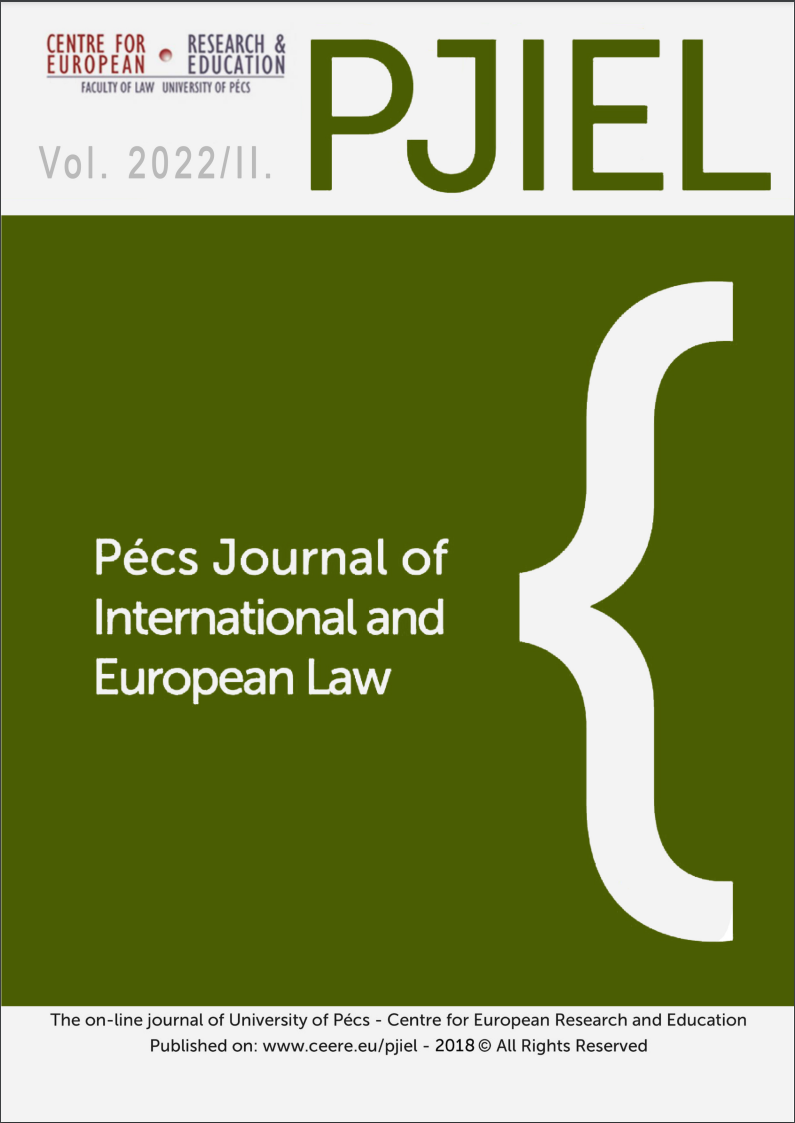
No. II (2022)
The editors are pleased to present issue 2022/II of the Pécs Journal of International and European Law, published by the Centre for European Research and Education of the Faculty of Law of the University of Pécs.
In the Articles section, Sandra Fabijanić Gagro analyses the concepts of human security and the responsibility to protect, highlighting their similarities as well as their differences. Tamás Török looks into the processing of personal data revealing racial or ethnic origin for the purpose of combating hate crime in the European Union. Upal Aditya Oikya applies a theoretical and comparative perspective to the national implementation of the Rome Statute of the International Criminal Court in various states.
In this issue’s detailed Case note, Elisabeth Sándor-Szalay and Balázs Kiss elaborate on the judgement in the of the European Court of Human Rights in Bakirdzi and E.C. v. Hungary as regards its connotations for national minority participation in the electoral process.
As always, a word of sincere gratitude is due to the anonymous peer reviewers of the current issue.
We encourage the reader, also on behalf of the editorial board, to consider the PJIEL as a venue for publications. With your contributions, PJIEL aims to remain a trustworthy and up-to-date journal of international and European law issues.
-
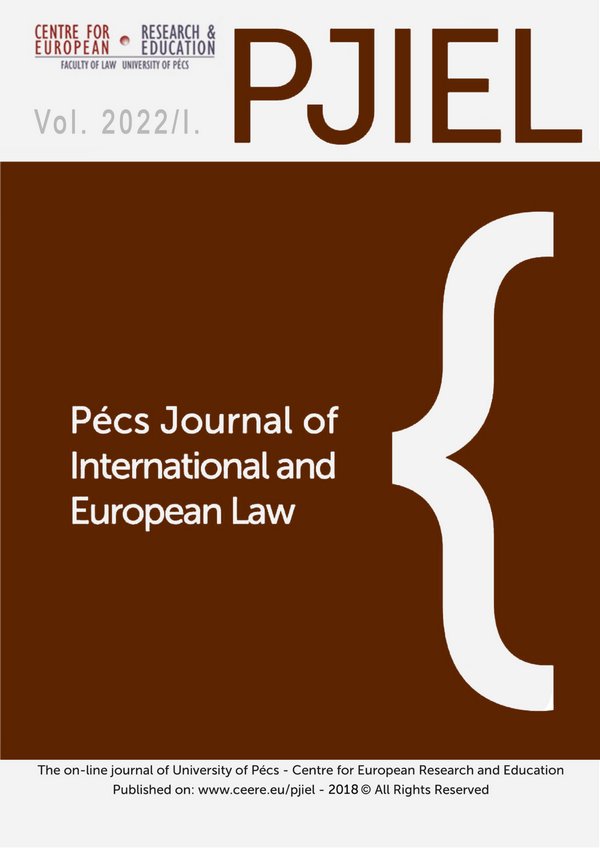
No. I (2022)
The editors are pleased to present issue 2022/I of the Pécs Journal of International and European Law, published by the Centre for European Research and Education of the Faculty of Law of the University of Pécs.
The editorial comments of the current issue address the legacy of Fridtjof Nansen againts the backdrop of current conflicts.
In the Articles section, Hatim Hussain and Sanskriti Sanghi analyse the difficult issue of satire and human rights protection by the ECtHR, focusing on the question of intent in this context, while Alexandru-George Moș undertakes a multilevel analysis of constitutional identity and illiberalism.
In the Case notes and analysis section, István Szijártó examines the implications of the Gavanozov II judgment of the European Court of Justice.
In the Reviews section, Ágoston Mohay reviews the monograph The Many Facets of EU Soft Law by Petra Lea Láncos (PPKE, 2022); whereas Éva Csorba reviews the edited volume Greece and Turkey in Conflict and Cooperation. From Europeanization to de-Europeanization, edited by Alexis Heraclides and Gizem Alioğlu Çakmak (Routledge, 2019).
As always, a word of sincere gratitude is due to the anonymous peer reviewers of the current issue.
-
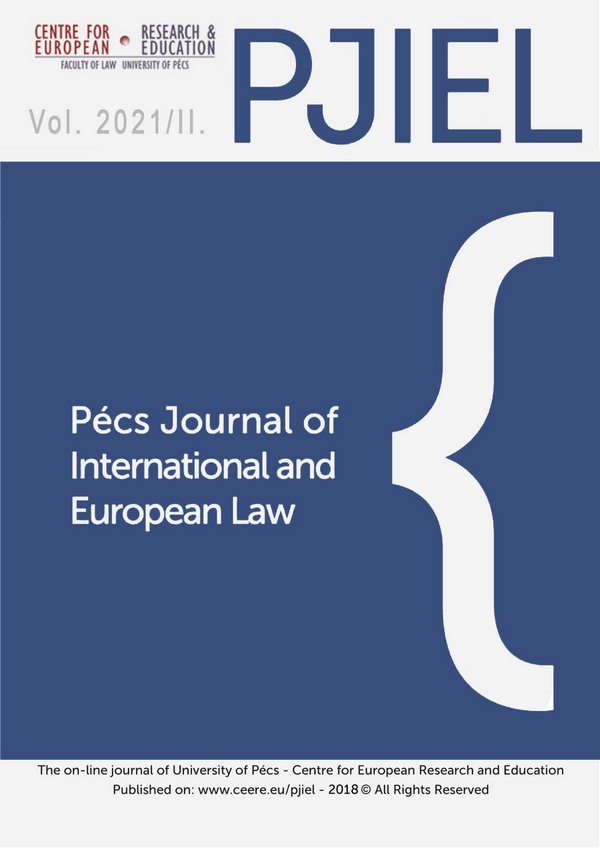
No. II (2021)
The editors are pleased to present issue 2021/II of the Pécs Journal of International and European Law, published by the Centre for European Research and Education of the Faculty of Law of the University of Pécs.
The editorial comments of the current issue reflect upon some of the implications of the recent Carter v. Russia judgment by the European Court of Human Rights.
In the Articles section, Brian Drummond analyses the legality of the nuclear deterrence policy of the United Kingdom under international law. Lilla Ozoráková asks and answers the question whether the standards of international criminal proceedings in terms of the right to a fair trial are sufficient. Anna Szerencsés looks at how the protection of fundamental rights has progressed, notably in the twelve years since the EU Charter was given legal binding force. Valéria Horváth gives account of the legal responses to migration induced by the 2010 Haitian earthquake on the American continent.
In the Case notes and analysis section, Csongor István Nagy provides analysis of Hungarian judicial practice connected to EU private international law in family and succession matters.
Last but not least, in the Reviews section, Mirabella Nezdei reviews Transnational Mobility and Global Health – Traversing Borders and Boundaries by Peter H. Koehn (Routledge, 2020).
As always, a word of sincere gratitude is due to the anonymous peer reviewers of the current issue.
-
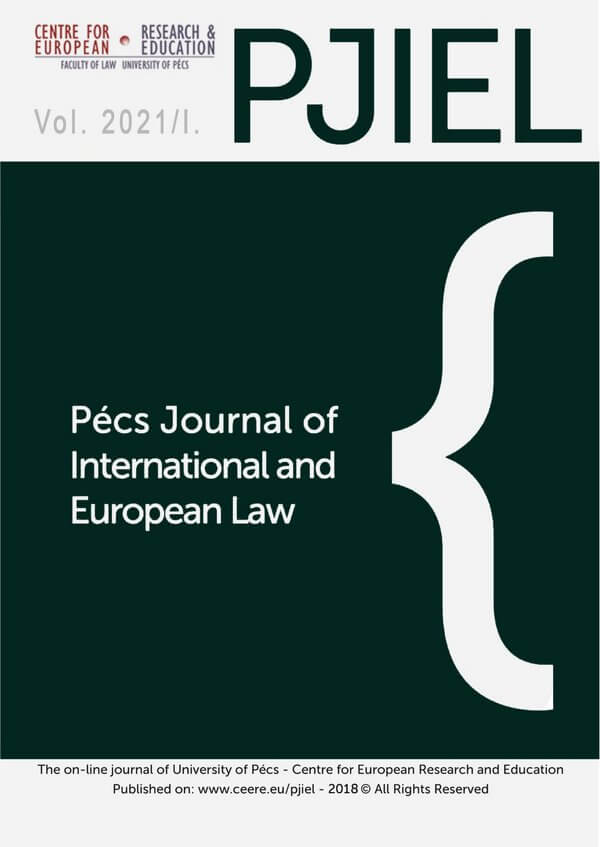
No. I (2021)
The editors are pleased to present issue 2021/I of the Pécs Journal of International and European Law, published by the Centre for European Research and Education of the Faculty of Law of the University of Pécs.
The editorial comments of the current issue delve into the renewed impetus in the accession of the European Union to the European Convention on Human Rights.
In the Articles section, Cherry James looks into the possibilities of student mobility post-Brexit, analysing inter alia the potential of the Turing Scheme. Attila Pánovics elaborates on the rules of the Escazú Agreement – which entered into force in April 2021 – pertaining to environmental human rights defenders. Zsuzsanna Rutai gives a comprehensive comparative analysis of how national human rights institutions engage with UN human rights monitoring mechanisms.
In the Case notes and Analysis section, Marcin Górski looks at how restrictions related to the Covid-19 pandemic affect the freedom of expression. István Szijártó examines case law touching upon the corelation between the application of the European Investigation Order and fundamental rights guarantees.
In the Reviews section, Mihály Maczonkai reviews the monograph ‘Great Judgments of the European Court of Justice: Rethinking the Landmark Decisions of the Foundational Period’ by William Phelan (Cambridge University Press, 2019). Finally, Ágoston Mohay and István Szijártó give account of the International Workshop organized in Pécs on Utilizing the E4J Training Modules developed by the UNODC.
As always, a word of sincere gratitude is due to the anonymous peer reviewers of the current issue.
-
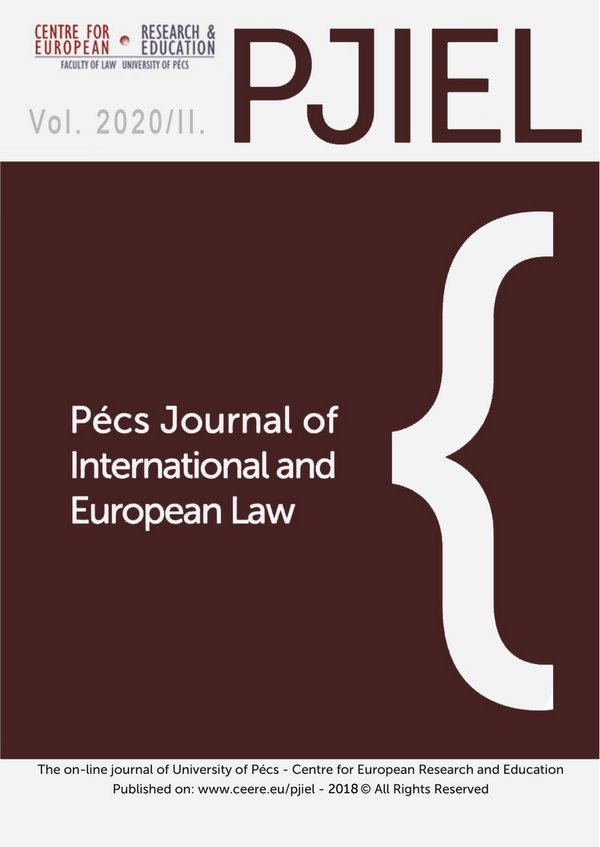
No. II (2020)
The editors are pleased to present issue 2020/II of the Pécs Journal of International and European Law, published by the Centre for European Research and Education of the Faculty of Law of the University of Pécs.
The editorial comments of the current issue address some aspects of the conflict in Nagorno-Karabakh. In this issue’s first article, Nives Mazur-Kumrić and Ivan Zeko-Pivač discuss the EU’s role as a global trendsetter in the fight against climate change, paying special attention to the funding scheme dubbed the Just Transition Mechanism. Sandra Fabijanić Gagro looks at the Responsibility to Protect through the lens of the protection of children. Petra Ágnes Kanyuk provides an appraisal of the effects of EU substantive criminal law harmonisation measures on Hungarian criminal law. Tomáš Strémy and Lilla Ozoráková ponder the possible impact of the introduction of the new offence of abuse of law on the independence of the judiciary in Slovakia. Upal Aditya Oikya considers whether atrocities against religious minorities of Bangladesh can be considered genocide. Finally, Ágoston Mohay provides a brief problem-raising overview of the responsibility of international organisations and their member states.
As always, a word of sincere gratitude is due to the anonymous peer reviewers of the current issue.
-
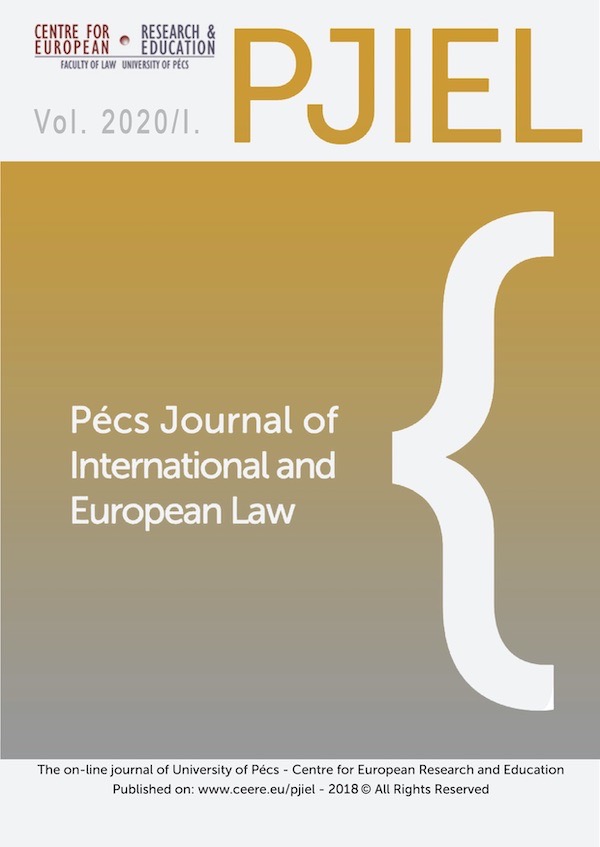
No. I (2020)
The editors are pleased to present issue 2020/I of the Pécs Journal of International and European Law, published by the Centre for European Research and Education of the Faculty of Law of the University of Pécs.
In this issue’s Articles section, Petra Perisic addresses the complex questions related to attribution of conduct in UN peacekeeping operations. Zsuzsanna Rutai elaborates upon the role of the Lanzarote Committee, the monitoring body of the Council of Europe Convention on the Protection of Children against Sexual Exploitation and Sexual Abuse. Péter Budai describes a new theoretical framework of the law of intergovernmental organizations and ponders its applicability to the European Union. Phet Sengpunya introduces the ASEAN perspective regarding online dispute resolution schemes for e-commerce, whereas István Szijártó analyses the efficiency of Joint Investigation Teams and the role of Europol and Eurojust in this context.
In the case notes section, Ágoston Mohay gives a concise analysis of the Dorobantu judgment of the Court of Justice of the EU from the perspective of the relationship between EU law and the European Convention on Human Rights.
As for this issue’s paper focusing on legal developments in the Western Balkans, Sandra Fabijanić Gagro analyses the concept of ‘Junction Area’ in the context of the Final Award in the arbitration proceeding between Croatia and Slovenia.
Finally, in the reviews section, István Tarrósy reviews the edited volume “Refugees and Migrants in Law and Policy. Challenges and Opportunities for Global Civic Education” published by Springer in 2018, while Bence Kis Kelemen reviews Harold Hongju Koh’s monograph entitled “The Trump Administration and International law” (Oxford University Press, 2019).
A word of sincere gratitude is of course due to the anonymous peer reviewers of the current issue.
-
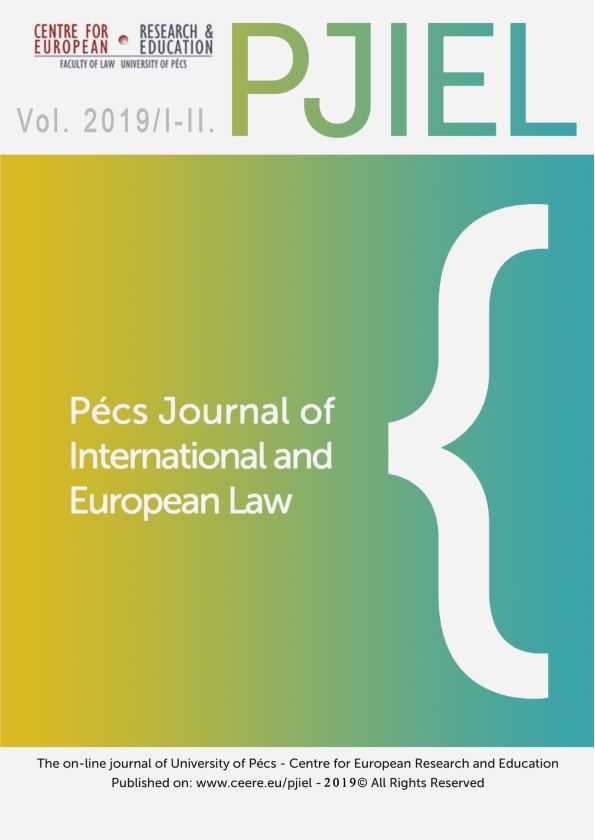
No. I-II (2019)
The editors are pleased to present the 2019 double issue of the Pécs Journal of International and European Law, published by the Centre for European Research and Education of the Faculty of Law of the University of Pécs.
In the Articles section, Ljubo Runjić analyses the consequences of the ex parte communications in the arbitration between Croatia and Slovenia. Botond-Zoltán Petres looks into the theory of Lex Mercatoria and its conceptualisation as an autonomous international system. Amna Hassan and Ahmad Hassan Khalid take a look at investment dispute settlement in the China Pakistan Economic Corridor context and its foreseeable regional impact. Olena Demchenko reviews some current challenges of electronic commerce in the gaming industry. Zsuzsanna Rutai considers the participation of children in standard-setting and monitoring efforts of international organizations. Finally, István Tarrósy examines the situation of the African diaspora in the Post-Soviet Space.
In the Case Notes and Analysis section, Joanna Mazur elaborates upon the challenges of the regulation of unjustified geoblocking, whereas Yll Mehmetaj and Nagip Skenderi investigate the role of customs budget revenues in economic development in Kosovo.
This issue’s review is not of a book but of a conference: István Szijártó reviews the Consensus Conference organised in Pécs in 2019 on migrant health issues, while giving his views on the significance of this issue in the context of EU asylum law and its planned reform.
A word of sincere gratitude is of course due to the anonymous peer reviewers of the current issue.
-
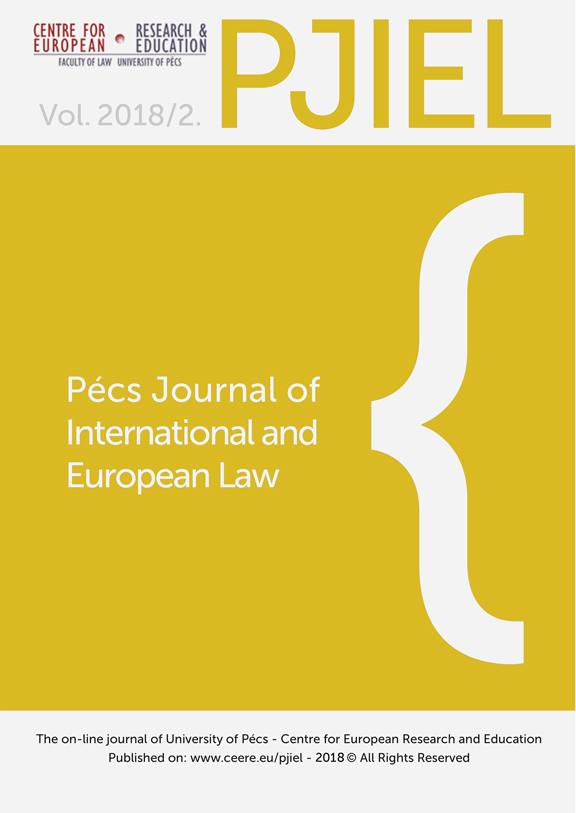
No. II (2018)
The editors are pleased to present issue 2018/II of the Pécs Journal of International and European Law, published by the Centre for European Research and Education of the Faculty of Law of the University of Pécs.
In the Articles section, Emese Pál gives an overview and compariosn of legal supervision over local self-governments in continental Europe. Shadi A. Alshdaifat elaborates on property rights and the concept of the common heritage of mankind in the context of outer space.
In the Case Notes and Analysis section, Olena Demchenko looks at the benefits and challenges of CRAB technology platforms and CRAB technology based smart contracts, while Mirlinda Batalli and Islam Pepaj analyse the possibility of increasing efficiency in public administration through better system of administrative justice.
In this issue’s review section, Hannes Hofmeister reviews the EUV/ AEUV Kommentar by Geiger & Khan & Kotzur published (in German) by Beck in 2016.
-

No. 1 (2018)
The editors are pleased to present issue 2018/I of the Pécs Journal of International and European Law, published by the Centre for European Research and Education of the Faculty of Law of the University of Pécs.
In the Articles section, István Lakatos undertakes to analyse the debate concerning universalism versus cultural relativism, focusing especially on women’s rights Mirlinda Batalli and Artan Fejzullahu look at the principles of good administration under the European Code of Good Administrative Behavior. Lilla Nóra Kiss shares her thoughts on the legal framework of unilateral withdrawal from the European Union through the lens of the Brexit process. Fanny V. Bárány gives a critical overview of the legislative history of the functioning of foreign higher education institutions in Hungary. Sabina Đipalo focuses on characterizing the inaction of the United Nations Security Council as a failure in the enforcement of international law as regards collective security. In the Case Notes and Analysis section, Laura Gyeney gives a thorough examination of the NA case (Case C-115/15) decided recently by the Court of Justice of the European Union. Andrei Dragan looks at the legal situation of so-called “New Minorities” in the states parties to the Framework Convention for the Protection of National Minorities. In this issue’s Reviews section, Ameni Mehrez reviews The Oxford Handbook of Refugee and Forced Migration Studies (Oxford, 2014) while Greta Gruzdytė gives an insight into the monograph The United Nations and the Politics of Selective Humanitarian Intervention by Martin Binder (Palgrave Macmillan, 2017). We encourage the reader, also on behalf of the editorial board, to consider the PJIEL as a venue for publications. With your contributions, PJIEL aims to remain a trustworthy and up-to-date journal of international and European law issues.
-
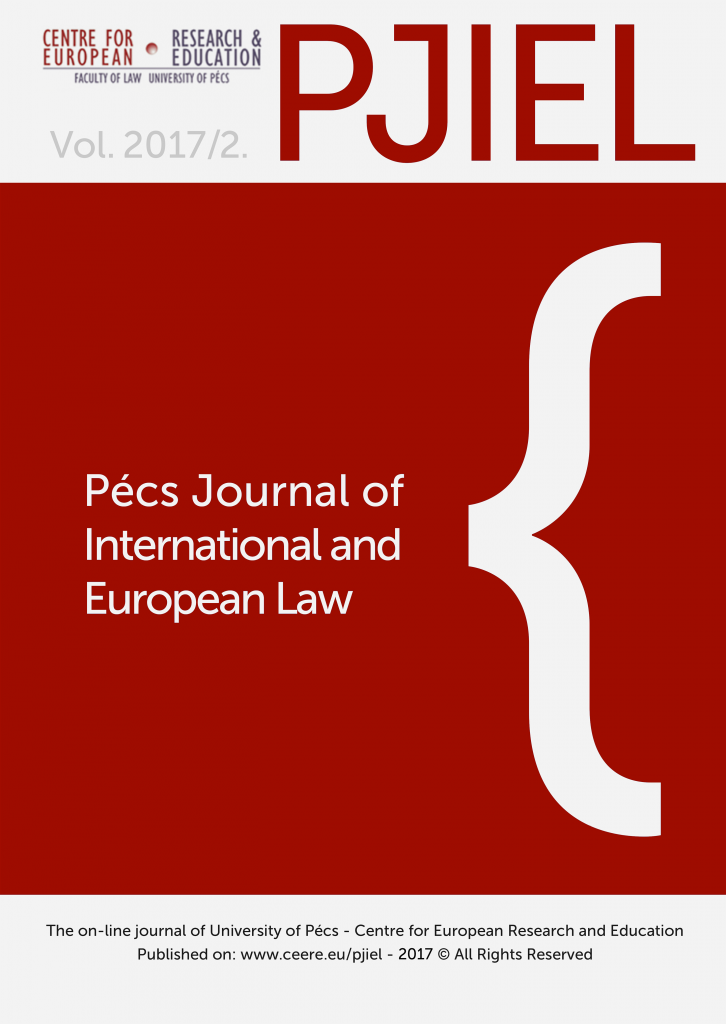
No. II (2017)
The editors are pleased to present issue 2017/II of the Pécs Journal of International and European Law, published by the Centre for European Research and Education of the Faculty of Law of the University of Pécs.
In the Articles section, Attila Pánovics focuses on the issue of non-compliance by the EU with the Aarhus Convention. Viola Vincze sheds light on the role that customary principles of international humanitarian law play in the protection of the environment, while Tamás Molnár looks at how EU migration law is shaping international migration law, specifically as regards the field of expulsion. As for this issue’s shorter reflections, Lukáš Mareček analyses the criminal responsibility of legal persons as introduced by the Special Tribunal for Lebanon. Zsolt Cseporán provides an overview of international and foreign trends regulating the freedom of artistic expression, whereas Andrei Dragan looks at current challenges facing the Dublin III regulation. Finally, Bettina Németh reviews ‘The Making of International Human Rights: The 1960s, Decolonization, and the Reconstruction of Global Values’ by Steven L. B. Jensen, published by Cambridge University Press in 2016.
-
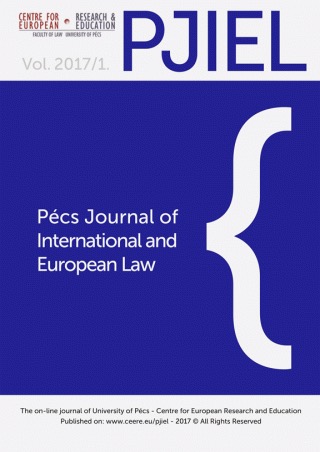
No. I (2017)
The editors are pleased to present issue 2017/I of the Pécs Journal of International and European Law, published by the Centre for European Research and Education of the Faculty of Law of the University of Pécs.
In the Articles section, Davor Muhvić looks into the issue of the legal personality of non-state entities in international law, focusing mostly on transnational corporations while providing a critical analysis of the most prevalent theoretical approaches to the issue. Catherine Odorige reflects on the interpretation of the 1951 Geneva Convention in light of the recent asylum and migration challenges. Ágoston Mohay and Norbert Tóth provide an analysis of Case C-438/14 Nabiel Peter Bogendorff von Wolffersdorff which concerns the national regulation of the use of nobility titles in light of EU law obligations. Gyöngyvér-Kovács Zsankó gives an overview of the situation of the Rohingyas and gives some suggestions as to the way forward, whereas Waddah Alrawashdeh provides an insight into the role of the judiciary in the enforcement of arbitral awards in Jordan. As for the current issue’s article focusing on the Western Balkans, István Lakatos gives an account of the potential of small states in United Nations diplomacy, with a case study of Montenegro.
-
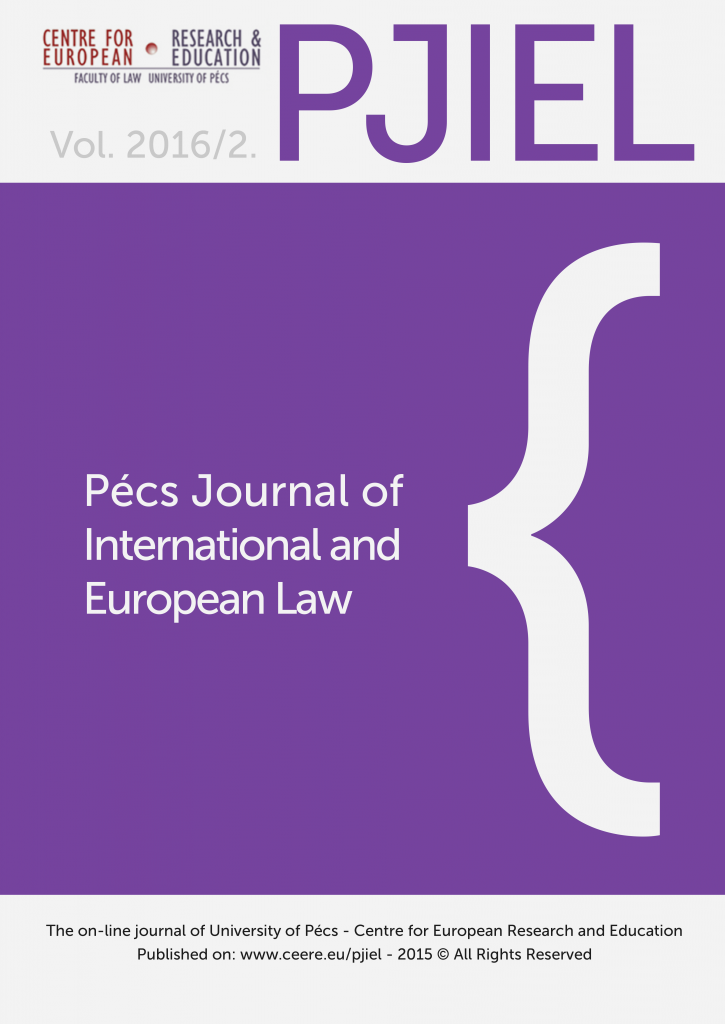
No. II (2016)
The editors are pleased to present to the reader issue 2016/II of the Pécs Journal of International and European Law, published by the Centre for European Research and Education of the Faculty of Law of the University of Pécs.
In the current issue, Cherry James looks at the consequences of Brexit on study mobility to and from the UK. Judit Tóth and her co-authors analyse the potential of adult education in the context of active citizenship. Barrett Jizeng Fan provides a detailed investigation of references made by the Court of Justice of the European Union to the case law of the European Court of Human Rights. Tamás Lattmann looks into the “ad hoc tribunalisation” of the International Criminal Court in the context of situations referred to it by the United Nations Security Council. Bianka Maksó delivers a brief reflection on the role of Binding Corporate Rules in the context of international data transfers. Finally, Bence Kis Kelemen reviews the book ‘The Drone A primer on the U. S. use of unmanned aircraft outside conventional battlefields’ published by Roman & Littlefield in 2016.
-
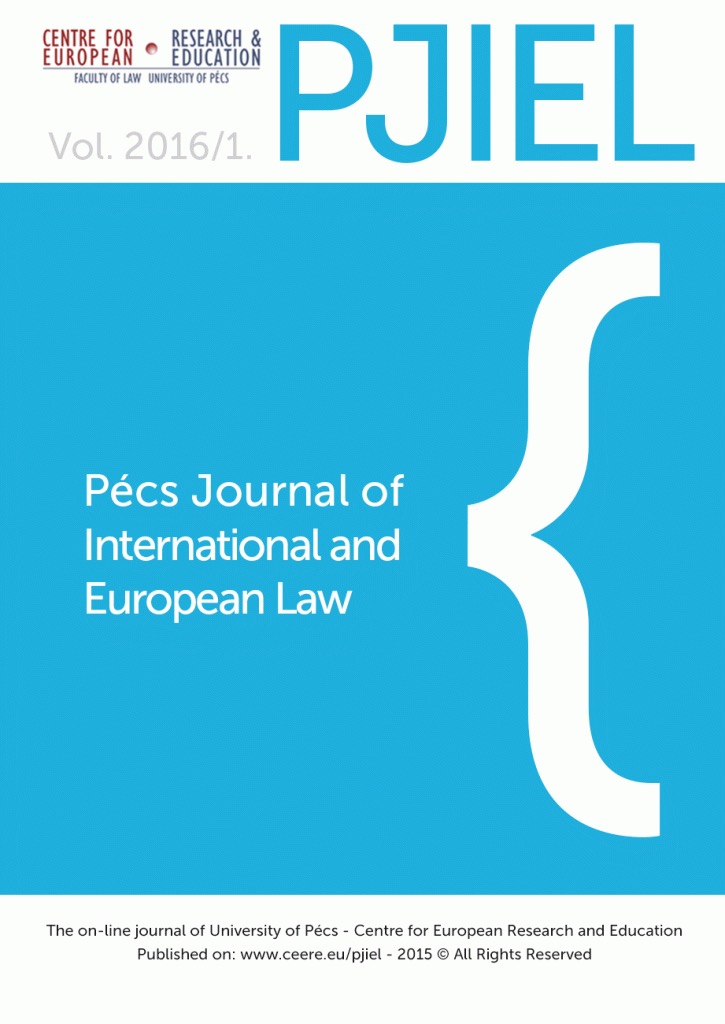
No. I (2016)
The editors are pleased to present to the reader the 2016/I issue of the Pécs Journal of International and European Law, published by the Centre for European Research and Education of the Faculty of Law of the University of Pécs.
In the current issue, Władysław Czapliński looks at the question of the International Legal Personality of Non-State Actors and their Recognition in public international law. Henning Bang Fuglsang Madsen Sørensen analyses the question of mutual trust as regards the European Arrest Warrant in light of recent hearings before the Court of Justice of the European Union. Jorn van Rij provides a case study on the modus operandi of organised crime groups involved in the trafficking and sexual exploitation of Hungarian women to the Netherlands. Catherine Enoredia Odorige discusses migration and remittances in relation to sex trade from Edo (Nigeria). Annemieke van Es contrasts freedom and security when looking the compatibility of a Dutch anti-terrorism related legislative proposal with freedom of expression as enshrined in the European Convention on Human Rights. Finally, Veronika Greksza reviews the edited volume International Human Rights Law published by Oxford University Press in 2014.
-
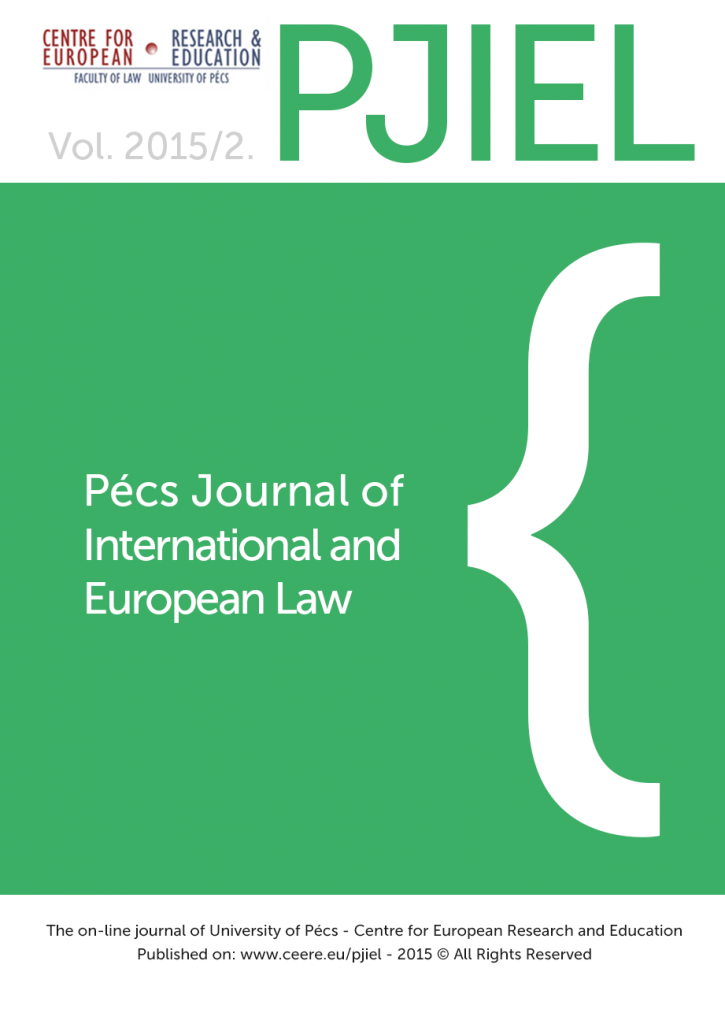
No. II (2015)
The editors are pleased to present to the reader the current issue of Pécs Journal of International and European Law, published by the Centre for European Research and Education of the Faculty of Law of the University of Pécs.
Our current issue looks at various issues of international and European law which are quite topical or carry great dogmatic importance.
In the Articles section, Ádám Lukonits firstly analyses whether normative rules aimed at democratization can paradoxically result in democratic deficits in light of their actual application and interpretation in practice, focusing on the rules of the nomination and election of the President of the European Commission. Emmanouela Mylonaki provides an overview of how Western Africa has responded to the development of the international law framework of counter-terrorism. Zoltán Papp provides a detailed international law analysis of the Air Defense Identification Zone, devoting special attention to rules and regulations pertaining to areas of airspace that do not fall under national sovereignty. Ágnes Töttős looks at the controversial issue of marriages of convenience as a means of abuse of rights in the EU migration law/citizenship context. Orsolya Szabó gives a brief account of the 2nd Hungarian-Sino International Forum organized in Pécs. As for this issue’s article focusing on developments in the Western Balkans, Nives Mazur-Kumric looks at the contested concept of citizenship in Kosovo. Finally, Marija Daka provides a review of the book entitled The Philosophical Foundations of Human Rights edited by Rowan Cruft, S. Matthew Liao, and Massimo Renzo and published in 2015 by Oxford University Press.
-
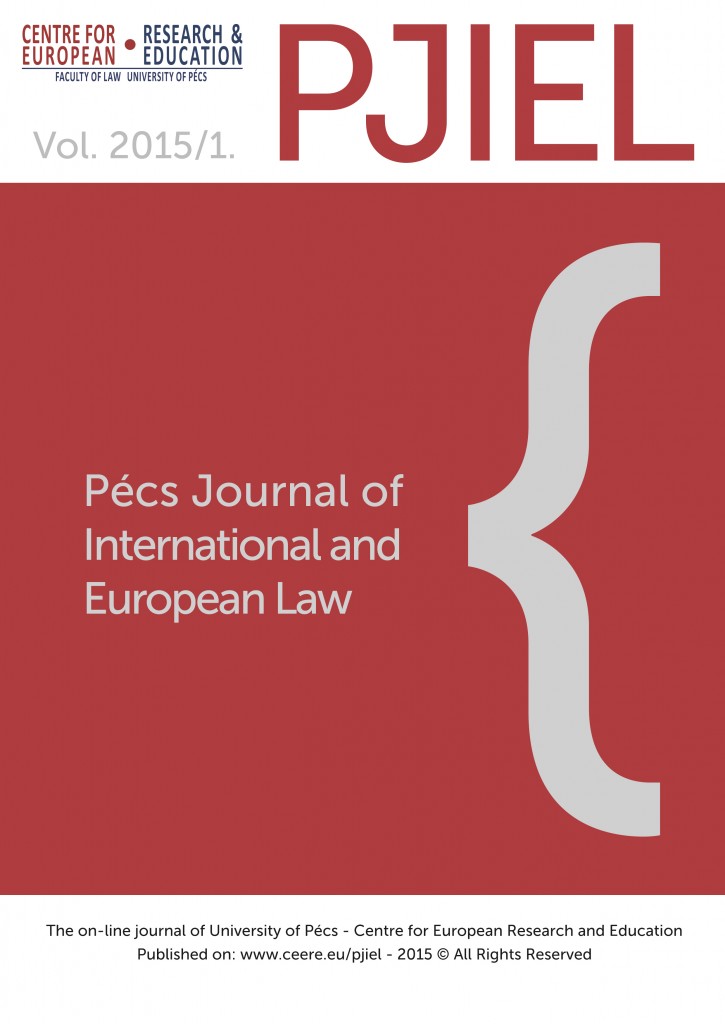
No. I (2015)
The Centre for European Research and Education is pleased to present the second issue of the Pécs Journal of International and European Law.
Once again, PJIEL looks at topical questions of international and European law from a legal perspective. The second issue is diverse as regards both authors and topics.
In the Articles section, Guilherme Lopes Da Cunha and Maeva Szlovik elaborate on the correlation of migration and security and the role of legal regulation from the point of view of human rights and cultural diversity. Veronika Greksza analyses how the European Court of Human Rights interprets and guarantees the right to a healthy environment, and how this relates to the concept of intergenerational equity. The two cases notes of the current issue deal with the relationship between international law and EU law, and national law and EU law, respectively. Ágoston Mohay analyses Opinion 2/13 of the Court of Justice of the European Union regarding the accession of the European Union to the European Convention on Human Rights. Georgina Naszladi looks at a rejection order by the Hungarian Constitutional Court which is relevant regarding the Court’s interpretation of the preliminary ruling procedure, touching upon the right to a fair trial as well. As for the section focusing on legal developments in the Western Balkans, Flamur Mrasori assesses compliance with European Union criteria in the light of non-contractual relations. Finally, Gyöngyvér Zsankó reviews the book The law of the European Union in Hungary: Institutions, processes and the law by Márton Varju and Ernő Várnay.
-
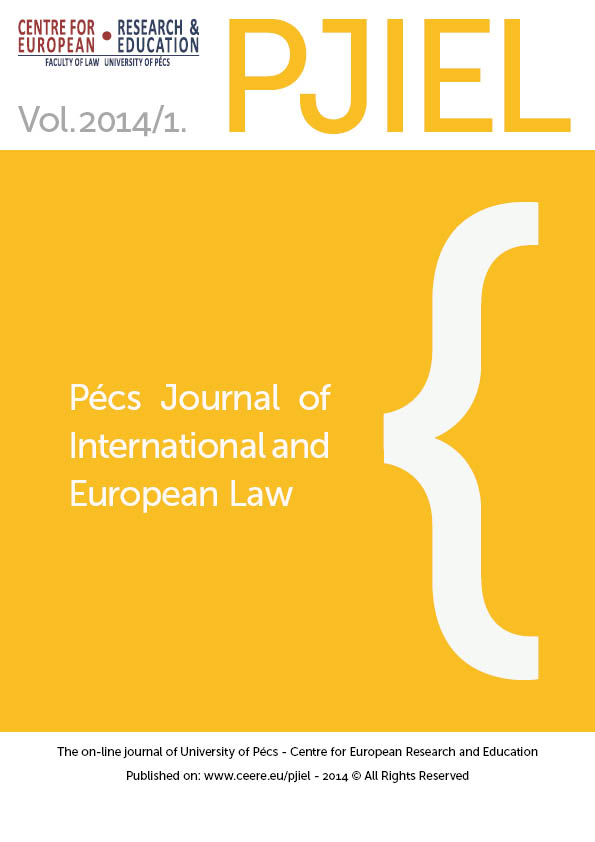
No. I (2014)
The Centre for European Research and Education is pleased to present the first issue of the Pécs Journal of International and European Law (PJIEL). The PJIEL aims to provide a platform for the publication of analysis and research relating to international law and European law, with specific attention devoted to legal developments in the Western Balkans. The additional Western Balkans focus of the PJIEL originates from the editors’ firm belief that the legal developments in the states of the aforementioned geographic area, and the process of their European integration is to be regarded as one of the most crucial and topical issues on the European continent.
The journal is published electronically twice a year by the Centre for European Research and Education of the University of Pécs, Faculty of Law. The PJIEL, as an open access journal, covers international law (public as well as private) and European Union law subjects. Articles are submitted to anonymous peer review before publication. As regards sections, the journal comprises of the following:
– Articles : longer studies regarding relevant issues of international and European law;
– Case notes and analysis: shorter reflections on recent judicial or other legal developments;
– Legal developments in the Western Balkans: Focusing on the states of the Western Balkans, especially (but not limited to) their relations with the European Union;
– Book reviews: reviews of books or collected volumes dealing with issues relevant to the journal.
The editors are very grateful for the work provided by the journal’s editorial board, and for their ongoing support regarding our efforts to make the PJIEL a truly noteworthy forum for scientific publication. Our editorial board members are Władysław Czapliński (Warsaw University), Gilbert Gornig (Philipps University of Marburg), Tamás Lattmann (National University of Public Service), Nives Mazur-Kumric (University of Liège), András Osztovits (Károli Gáspár University of the Reformed Church), Gábor Sulyok (István Széchenyi University), Jorn van Rij (InHolland University of Applied Sciences) and Norbert Tóth (National University of Public Service).
The publisher of the journal, the Centre for European Research and Education (CEERE) was originally established in 1996 and incorporated into the Faculty of Law of the University of Pécs in 2000. It has 14 years of experience in curricula development, providing courses on European integration issues, editing publications, organizing conferences and roundtable debates on EU policies and law. The University of Pécs is one of the biggest state universities in Hungary, and plays a significant role in higher education on national and international level as well as in the academic, economic and social life of the region. As one of the most prestigious legal education institutions of Hungary, the Faculty of Law celebrated the 90th anniversary of its establishment in 2013.
The debut issue of the PJIEL deals with various current issues of international and European law which all deserve scientific. Adrienne Komanovics evaluates recent developments regarding the strengthening of UN human rights treaty bodies. AnikóSzalai assesses the prospects of a more unified international protection regime for minorities and the rights of indigenous peoples. Ágnes Töttős explores the past, present and future of the EU’s Seasonal Workers Directive. Melinda Szappanyos takes a comparative approach to analysing the content and enforcement of the right to education in higher education in Council of Europe member states and in the Republic of Korea. Jorn van Rij looks at human trafficking and prostitution policy from a European criminological perspective. Norbert Tóth and Balázs Vizi deliver the Western Balkans-focussed article of the issue when they look at the international law obligations relating to minority rights regarding Kosovo. Finally, Veronika Grekszaand Johannes Hermann provide a review of Christoph Grabenwarter’s Commentary of the European Convention on Human Rights.

